Search
Viewing 2190 to 2205 of 3126 news
-

Découvrez les modes de production de 9 variétés de dattes marocaines
Meriem HILALI | 28/05/2020
Pour une meilleure mise en valeur des dattes marocaines, les agriculteurs présentent les modes de production et les caractéristiques nutritionnelles de 9 variétés phares des oasis du Drâa, Toudgha et Ouhmidi.Décoouvrez en plus à travers cette vidéo.
-

Le patrimoine phoenicicole marocain compte plus de 450 variétés de dattes
Meriem HILALI | 28/05/2020
Le patrimoine phoenicicole marocain compte aujourd'hui plus de 450 variétés de dattes et des milliers de variétés hybrides (croisement de variétés distinctes) appelés Khalts ou Sairs. Découvrez en plus à travers cette vidéo.
-

Système d’irrigation peu gourmand en eau dans la filière du safran au Maroc
Meriem HILALI | 28/05/2020
Dans la zone de production de l’or rouge du Maroc, le projet de Développement des Filières du Safran et du Palmier Dattier dans les régions Souss-Massa et Drâa-Tafilalet a mis en place un système d’irrigation goutte-à-goutte, peu gourmand en eau, contrairement à l’irrigation gravitaire traditionnelle.Découvrez en plus dans la vidéo.
-
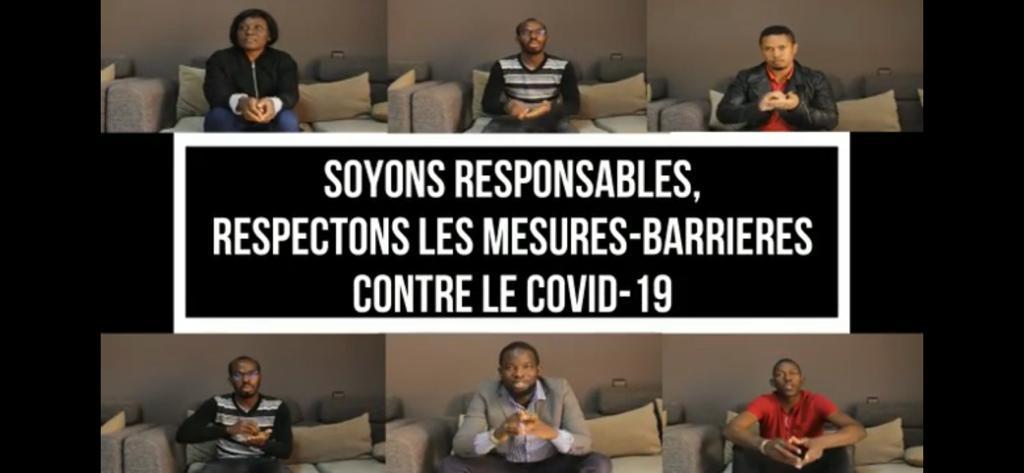
Covid-19 : Campagne de sensibilisation sanitaire à destination de la population migrante au Maroc
Meriem HILALI | 28/05/2020
Dans le cadre des actions d’urgence face au Covid-19, le projet Empowerment juridique des personnes migrantes en partenariat avec l’ALCS, l’Association de Lutte Contre le Sida, ont entamé un partenariat dans le cadre d’une campagne de sensibilisation dans la région de Tanger-Tétouan-Al Hoceïma. L’intervention appui et finance la réalisation de capsules vidéo de sensibilisation sanitaire, dépliants et affiches ciblant la population migrante de cette région. Les capsules sont en plusieurs langues africaines (Baoulé, Lingala, Malinké, Pulhar, Soussou, Wolof) en plus du français.Pour en savoir plus cliquer sur : https://www.youtube.com/cha…/UCfED1I3YZoufz0hErG2EiPQ/videos
-
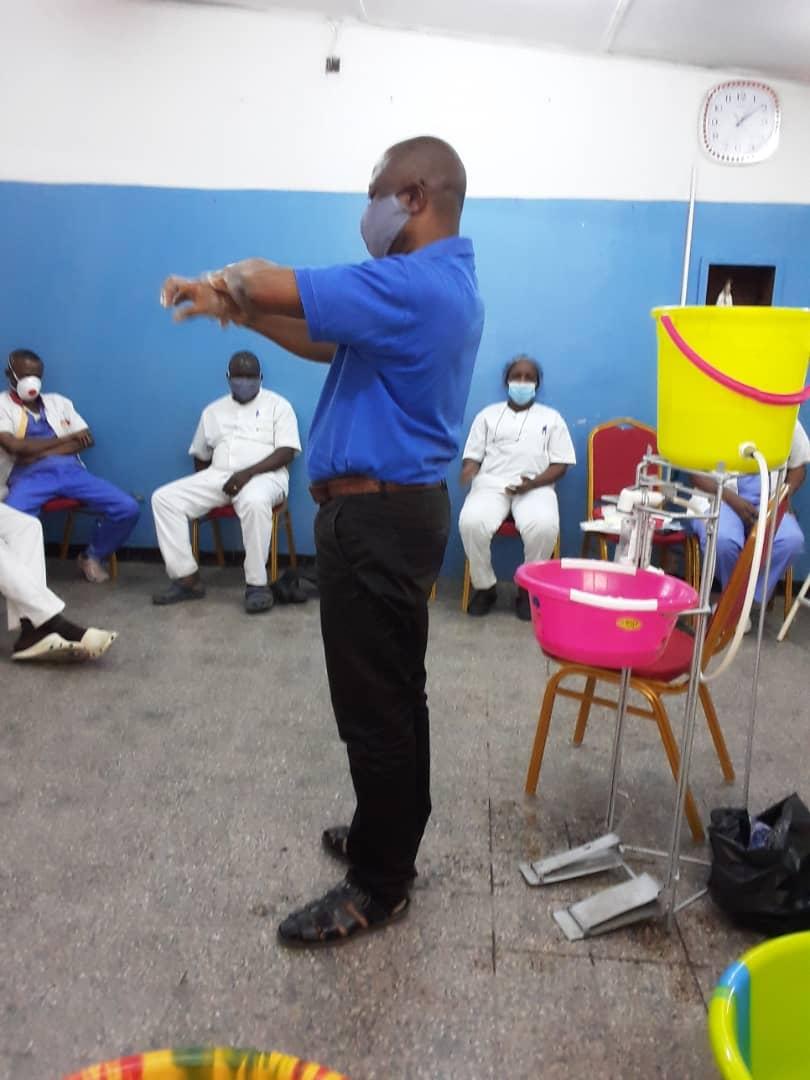
Formation en prévention et controle de l'infection pour le personnel de l'hôpital St Jospeh en RDC
Grâce MALI FAIDA | 28/05/2020
Le programme de renforcement de l’hôpital général de référence Saint Joseph de Limete a organisé du 25 au 27 mai 2020 une première formation intégrée en prévention et contrôle de l’infection (PCI) liée au Covid-19 au profit de 20 agents de cet hôpital. La formation s’est déroulée à l’hôpital avec la participation d'infirmiers, de médecins, du personnel administratif et des techniciens de surface. Le but de cette formation est de mieux protéger la biosécurité du personnel et des patients à St Joseph dans tous les services en renforçant la connaissance et la pratique de l’ABC de prévention et contrôle d’infection, mais en améliorant la gestion de l’hygiène dans l’hôpital. Un véritable comité d’hygiène se responsabilisera de tous les aspects en lien avec ce domaine : gestion d’eaux usés, gestion de déchets solides, buanderie et incinérateurs, mise en place de poubelles et hygiène dans tous les services.Cette formation, urgente vu la nécessité de bloquer la propagation du Coronavirus dans l’hôpital, est la première dans un plan de développement des ressources humaines qui s’annonce pour St Joseph et qui mettra l’accent sur : L’amélioration de la qualité des soins à travers la formation continue, modulaire et avec l’application de nouvelle technologie informatisée ; Le renforcement de la rationalisation et efficience de tous les services de l’hôpital, cliniques et autres. Cette formation s’étendra pour former au total 100 agents de différentes catégories professionnelles au service de cet hôpital.
-

« Transformer et commercialiser la noix de cajou : un projet modèle d'Enabel au Bénin »
Reece-hermine ADANWENON | 18/05/2020
Avec 20 années d’expériences avérées dans l’appui aux filières agricoles, Enabel au Bénin travaille sur la chaine de valeur de l'anacarde, produit énigmatique du pays. Ce programme met l’accent sur l’augmentation de la production et de la productivité, l’amélioration du taux de transformation locale des noix et de la pomme d’anacarde et le renforcement de la commercialisation et de l’exportation des noix. Le but est de mettre aux normes les techniques de production, de rendre plus exportable la noix et ses dérivés afin d’augmenter lex niveaux de vie et de revenus des producteurs et transformateurs. Via le contrat de partenariat établit entre Enabel et COLRUYT group, une chaine de supermarchés belge, 250 tonnes d’amandes de cajou conventionnelles et 70 tonnes d’amandes de cajou biologiques seront exportées chaque année du Bénin vers la Belgique. Découvrez ce programme à travers cette interview de Kader Toko Worou, responsable du projet.
-
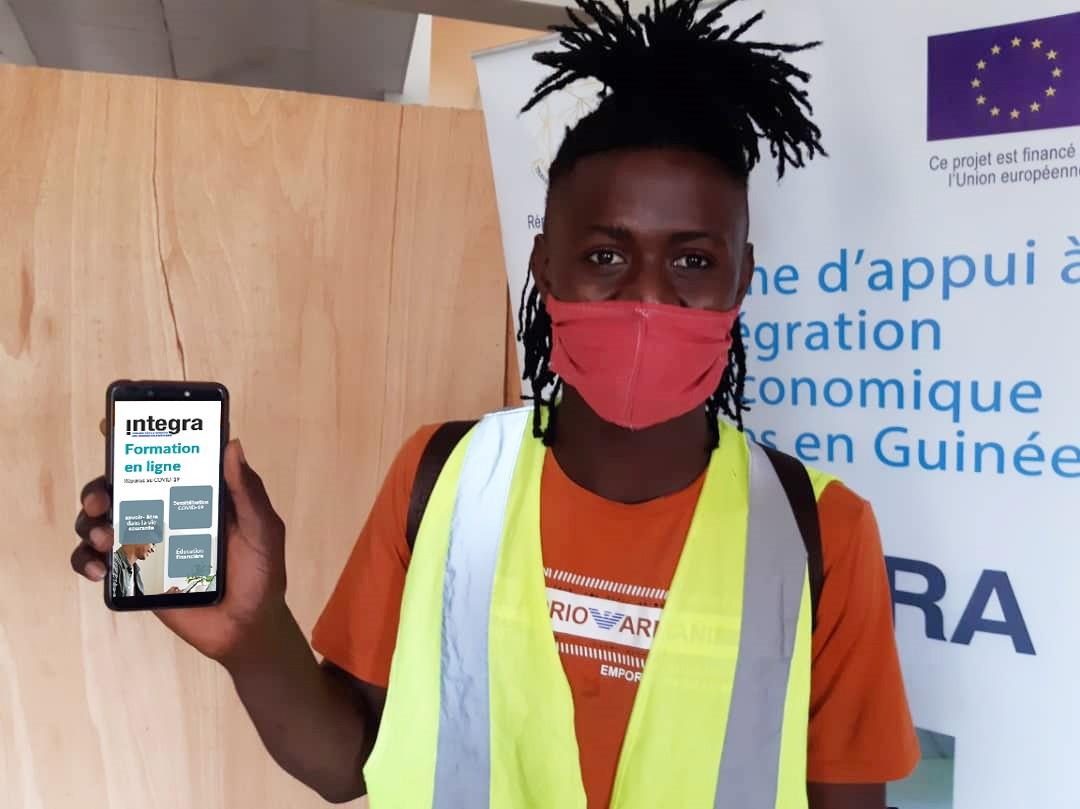
Covid-19 : la formation aux bouts des doigts avec le projet INTEGRA en Guinée
Aissatou BAH | 15/05/2020
Le programme d’appui à l’intégration Socio-Economique des jeunes (INTEGRA) va procéder, ce lundi 18 mai 2020 au lancement de son plan pilote de formation en ligne, afin que ses bénéficiaires puissent continuer à apprendre malgré les restrictions sanitaires liées à l’épidémie du COVID-19. Le principe est d’assurer la continuité des activités par l’administration de modules de formation à distance, auprès des deux cents jeunes engagés dans ce parcours.Cette offre a plusieurs objectifs : - Former les jeunes à mieux s’insérer dans le monde du travail en contribuant à l’amélioration de leur employabilité. - Diminuer le nombre de jeunes dans les salles de cours afin de maintenir une distance sociale de sécurité (1m50) pour réduire les risques de propagation du COVID-19.- Permettre l’utilisation et le développement des ressources numériques. Ces nouveaux modules de formation abordent plusieurs thèmes : - Le savoir- être dans la vie courante et sur le lieu de travail- L’éducation financière - La sensibilisation aux risques liés à la migration dangereuse, elle-même liée au COVID-19. Les contenus sont développés sous des formats vidéo, en langues locales, et proposent des présentations adaptées pour faciliter la compréhension des apprenants. Ils sont accessibles via une plateforme Open Source. Les apprenants participant à ce programme reçoivent une rémunération journalière de 35 000 GNF dont 15 000 GNF en épargne capitalisée.Ils bénéficient également d’un accompagnement et d’une dotation hebdomadaire de connexion à Internet pour faciliter le téléchargement des contenus des cours.Le programme INTEGRA se veut une contribution pour amorcer de nouvelles dynamiques dans le développement socio-économique en Guinée.Financé par l'Union européenne, INTEGRA crée des opportunités pour la jeunesse guinéenne à travers la préparation à la vie professionnelle dans les établissements scolaires, la réalisation d’infrastructures économiques, la formation professionnelle, la création d’emplois durables et le développement de l’entrepreneuriat. A travers ce programme, ce sont plus de 15.000 jeunes qui seront directement accompagnés pour mettre en œuvre cette nouvelle dynamique socio-économique par la création d’emplois et des appuis au développement de l’entrepreneuriat en Guinée.
-

Commersialisation de dattes au Maroc
Meriem HILALI | 13/05/2020
Grâce au soutien du projet d'Appui des Groupements d'Intérêt Économique pour le développement de la filière phœniciculture au niveau des oasis marocaines (PAGIE) ANDZOA, les dattes marocaines sont au menu du four ! Et ce malgré la crise du COVID-19. Notre collègue Habiba nous explique comment, tout en respectant les normes d’hygiène!
-

Maroc: Covid-19 : Renforcer la résilience des agriculteurs
Guido COUCK | 13/05/2020
Dans le Sud du Maroc, les producteurs des dattes et du safran sont durement touchés par la sécheresse, pour la deuxième année consécutive. En plus, l'activité économique des coopératives a été affectée à cause de l’annulation en avril des événements clés pour la commercialisation des produits de terroir, comme le Salon Internationale d’Agriculture au Maroc, et des restrictions sévères sur le transport réfrigéré due au confinement. A travers nos projets d’appui aux filières agricoles, nous accompagnons les coopératives pour trouver des solutions de commercialisation innovantes à leurs produits : commercialisation en ligne, distribution sécurisée dans les supermarchés et les magasins des grandes villes et pour le développement de stratégies de marketing digital pour l’export. Nous renforçons aussi les capacités des organisations et des producteurs pour respecter les protocoles d'hygiène et les gestes barrières dans la lutte contre le COVID-19, dans les oasis et dans les unités de conditionnement, la désinfection et l’application de bonnes pratiques dans la chaine agro-alimentaire ainsi que l’équipement des unités de valorisation des dattes et du safran en matériel de protection et d’hygiène. Ces actions, axées sur la communication, la digitalisation et l’appui institutionnel de nos partenaires marocains, jettent les jalons d'une solution durable et structurelle qui rendra les agriculteurs et les personnes migrantes plus résilients dans l’étape délicate qui accompagnera la reprise : les ventes en ligne deviendront plus importantes ; tout comme la formation à distance et la protection sanitaire des produits agricoles.
-
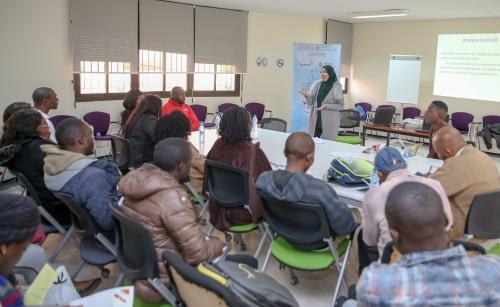
Maroc: Covid-19 : Renforcer la résilience des personnes migrantes
Guido COUCK | 13/05/2020
En réponse à la crise sanitaire et en collaboration avec ses partenaires nationaux au Maroc, Enabel met en œuvre des actions urgentes pour appuyer les populations les plus vulnérables à mieux faire face à la pandémie. L’impact de la crise au Maroc a conduit un grand nombre de personnes migrantes, souvent d'origine sub-saharienne, à des situations économiques extrêmement difficiles. La plupart d'entre eux travaillent dans l’économie informelle, mais à cause de la crise COVID-19 la majeure partie des activités est à l’arrêt, et ils n’ont plus de revenus. Depuis 2016, plusieurs projets de l’agence se concentrent sur l’intégration économique des migrants en cherchant à améliorer leur employabilité au Maroc, l’accompagnement des Marocains résidant en Belgique dans la création de leur entreprise au Maroc et l’amélioration de l’accès des migrants et réfugiés à leurs droits via le renforcement des compétences des acteurs pouvant faciliter cet accès. À travers ses projets de migration, Enabel travaille, entre autres, à l'amélioration de la communication concernant les mesures de prévention et d'hygiène, ainsi que les droits sociaux des personnes migrantes, demandeurs d’asiles et réfugiés. Elle accompagne l’institution marocaine d’assistance sociale Entraide Nationale dans l'organisation d’initiatives de réponses rapides aux besoins de base de cette population. Enabel renforce également la coordination locale à travers le développement d’une boîte à outils digitaux permettant aux associations membres des réseaux locaux de maintenir leurs échanges (qui se faisaient en présentiel auparavant) et leur coordination afin d’apporter une assistance aux plus vulnérables. Finalement, à cause des fermetures des universités, les Cliniques Juridiques des universités de Casablanca, Oujda, Rabat et Tanger reçoivent du matériel digital développé par des universités partenaires belges ou par Enabel directement pour continuer à renforcer leurs compétences en accès aux droits.
-
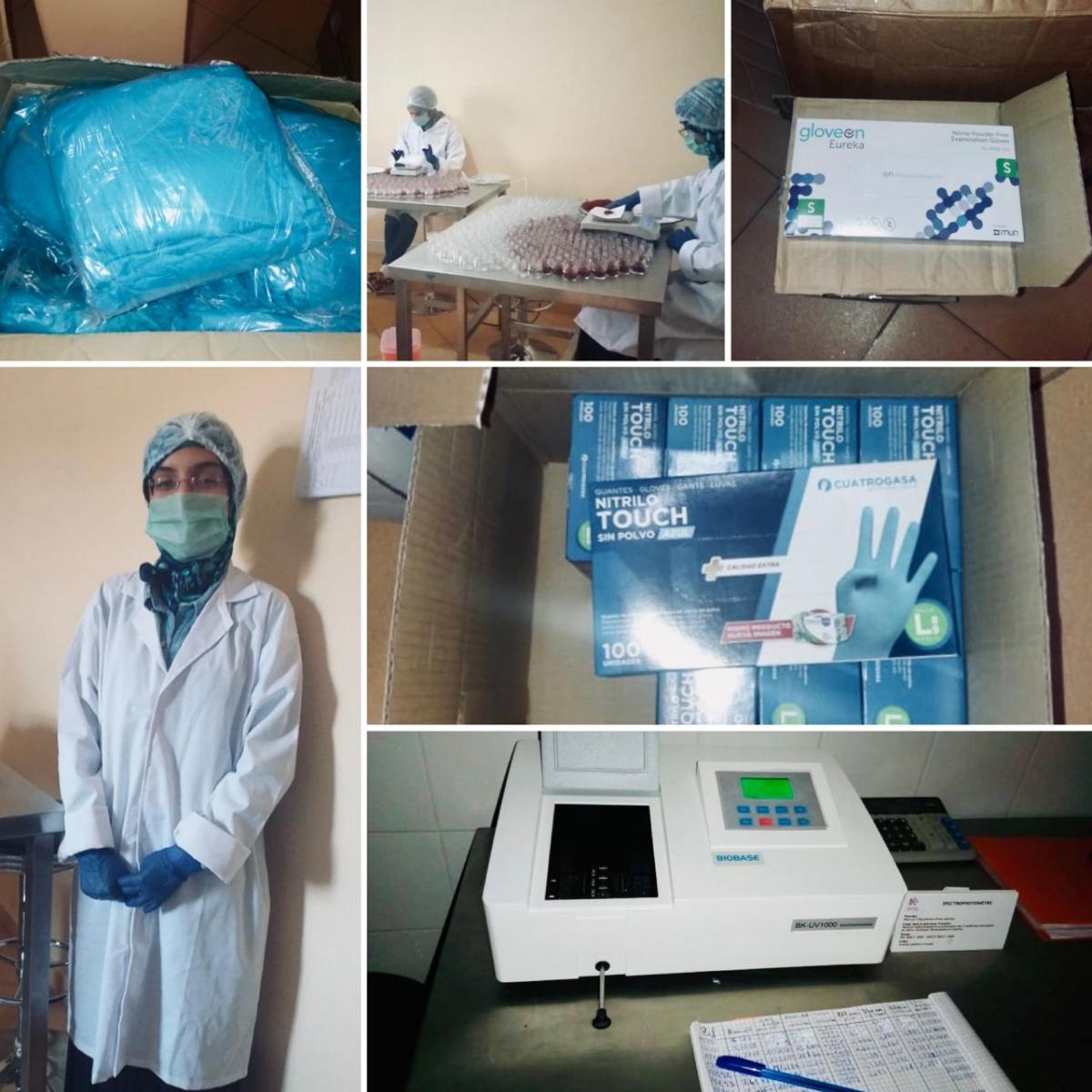
Maroc: Mesures d'hygiène améliorées dans la filière du safran suite au Covid-19
Meriem HILALI | 12/05/2020
Pour éviter la propagation du virus et faciliter le travail du conditionnement du safran dans de bonnes normes, le projet de développement des filières du safran et du palmier-dattier a doté trois organisations professionnelles de safran par un kit d’hygiène.Il a acquis un deuxième spectrophotomètre au profit du laboratoire de la Maison du Safran à Taliouine. Avec cette crise du Covid-19, il est primordial et obligatoire de réaliser des analyses avant la livraison de chaque commande aux clients. Le spectrophotomètre va permettre la réalisation des analyses physico-chimiques en conformité avec les normes nationales et internationales.
-

L ’appui d'Enabel à l’opérationnalisation des centres d’appel d’urgence et de secours au Burkina Faso
Kader TAPSOBA | 08/05/2020
L’opérationnalisation des centres d’appel et de secours constitue une des recommandations du forum national sur la sécurité tenue à Ouagadougou en octobre 2017. Dans ce cadre, le PARSIB ((Projet d’Appui au Renforcement de la Sécurité Intérieure du Burkina) a appuyé le Ministère de la sécurité à travers la modernisation du Centre National de Veille et d’Alertes et du Centre d’appel de la Brigade Nationale des Sapeurs-Pompiers. Le PARSIB a procédé à la remise d’un Poste Médical Avancé pour le renforcement du dispositif d’intervention médicale d’urgence.
-

Mobiliser l’expertise belge dans le domaine portuaire pour aider le Bénin à améliorer sa performance
Reece-hermine ADANWENON | 06/05/2020
Depuis 2019, Enabel coordonne un ambitieux projet au Bénin dans le but d’améliorer la compétitivité et la performance du Port Autonome de Cotonou en renforçant son positionnement concurrentiel vis-à-vis des autres ports de la sous-région.La Belgique a décidé de s’investir de manière significative auprès des acteurs portuaires afin de relever ce défi en mobilisant les énergies et les compétences des acteurs publics et privés, en Belgique, au Bénin et ailleurs. Découvrez les enjeux et les défis de cette initiative à travers cette interview avec Hervé Corbel, Intervention Manager du Projet PASPort.
-

Des agents de santé mieux formés et outillés à la riposte au Covid-19 au Mali
Nènè TRAORE | 30/04/2020
En réponse au plan d’action de riposte de la région de Koulikoro contre le covid 19, Enabel Mali à travers son intervention Renforcement des capacités des Institutions et des acteurs de la société civile (IRC) a organisé du 21 au 23 Avril 2020, une formation des formateurs à l’intention de 54 professionnels de santé du niveau régional et de districts sanitaires de la région. Cette formation a été initiée dans le cadre d’un plan de renforcement des capacités qui lie le projet IRC à la direction régionale de santé. En effet, le personnel de santé constitue le premier maillon de contamination et de propagation de la maladie vu leur contact avec les malades. Ils doivent avoir les informations et les compétences nécessaires pour briser la chaine de contamination et sensibiliser la population sur les mesures barrières et autres mesures préventives. A l’issue de cette formation des formateurs une cérémonie de remise de matériels et équipements de protection contre le COVID-19 a été organisée entre la Direction Régionale de la Santé et Enabel en présence du Gouverneur de la Région de Koulikoro. Ce qui KIT sera distribuer au niveau des différentes formations sanitaires de la Région afin de mettre en place une équipe d’intervention rapide et des salles d’isolement au niveau de 10 Districts sanitaires. Il est important de souligner que cette formation de formateurs sur le COVID-19 au niveau régional, sera suivie par des actions de formation au niveau local. Ainsi avec l’appui financier d’Enabel 558 Agents Technique de santé dans 10 districts sanitaires seront formés et 1000 leaders d’opinions communautaire seront sensibilisés sur le COVID-19 afin d’assurer la prévention et la lutte contre cette pandémie.
-
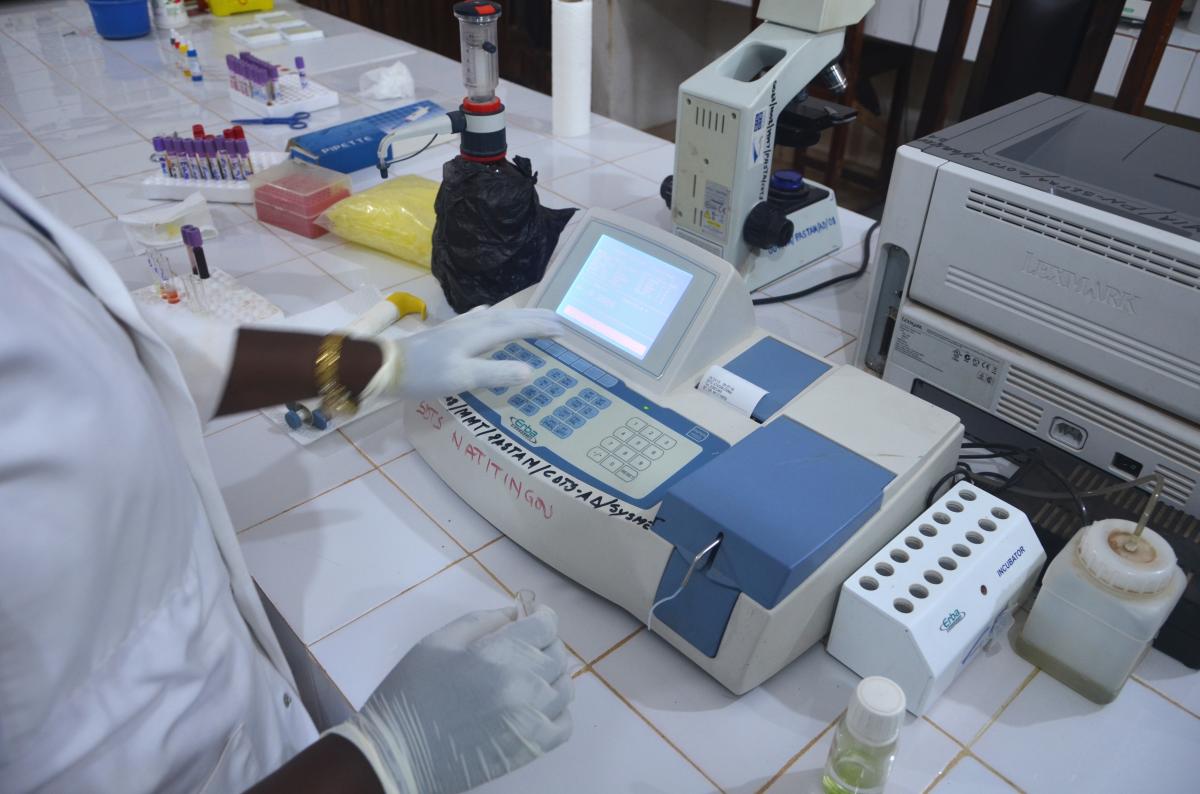
L’AFD accompagne le gouvernement béninois dans son plan de riposte au Covid-19
Reece-hermine ADANWENON | 29/04/2020
Communiqué de presseLA FRANCE SOUTIENT LE PLAN DE RIPOSTE AU COVID 19 DU BENIN AVEC UN APPUI DIRECT DE DEUX MILLIARDS DE FCFACotonou, le 29 avril 2020 – Avec ce financement de 2 milliards de FCFA de l’Agence française de développement (AFD), plus de 60 000 tests virologiques (PCR) viendront améliorer les capacités de diagnostic du pays et plusieurs centres de traitement et de prise en charge seront aménagés. Le ministère de la Santé via ce soutien de la France renforcera ses capacités de dépistage, de surveillance sanitaire, de prise en charge et de sensibilisation des populations face à la pandémie. La France se mobilise pour répondre à l’urgence sanitaire mondiale conformément aux engagements qu’elle a pris. Dans le cadre de l’initiative « COVID 19 - Santé en commun » lancée le 9 avril dernier, l’Agence française de développement (AFD) a décidé d’un financement de 2 milliards de francs CFA visant à soutenir le Bénin dans sa lutte contre la pandémie. Mis en oeuvre par l’agence de coopération belge ENABEL, ce financement apporte un soutien immédiat au plan de riposte du gouvernement béninois. Cette contribution apporte un appui au ministère de la Santé en renforçant les capacités (i) de diagnostic/dépistage, (ii) de surveillance sanitaire, (iii) de prise en charge, de (iv) communication et de sensibilisation des populations face à la pandémie : Plus de 60,000 tests naso-pharyngé (PCR) pourront être commandés d’ici le début du mois de mai, ainsi que l’équipement nécessaire à leur interprétation. Des formations seront organisées au profit de personnels de laboratoire, notamment au profit du laboratoire de Parakou (Borgou). La surveillance sanitaire au niveau de 64 points d’entrées du territoire sera renforcée à travers l’acquisition d’équipements de protection individuelle et de thermoflashs. En termes de prise en charge, afin de leur permettre d’accueillir et de traiter des patients contaminés par le COVID19, plusieurs centres hospitaliers seront réhabilités ou aménagés. Les travaux seront financés par la contribution de l’AFD. Des séances de sensibilisation et de communication à l’échelle communautaire seront organisées et des dispositifs de téléconsultation médicale seront mis en place au bénéfice des populations. L’AFD apporte cette réponse rapide au plan de riposte du Bénin à travers une adaptation de son projet « EQUITE » (« Ensemble pour une qualité des soins équitable et transparente »), qui bénéficie d’une subvention de 11 millions d’euros (7,233 milliards de FCFA) dont une part sera dédiée à la lutte contre les effets du Covid 19 au Bénin. L’AFD a également décidé de renforcer ce soutien par un financement complémentaire de 2 millions d’euros, portant ainsi sa contribution au plan de riposte sanitaire à 3 millions d’euros, soit 2 milliards de FCFA. « A travers cet appui, la France concrétise son engagement à se tenir aux côtés du Bénin pour faire face aux enjeux sanitaires induits par une crise inédite à l’échelle mondiale. » Véronique Brumeaux, Ambassadrice de France au Bénin. « Partie-prenante de l’élan de solidarité mondiale sans précédent pour faire face à la crise sanitaire COVID19 en Afrique, l’AFD est pleinement engagée dans une réponse ciblée aux enjeux sanitaires posés par cette pandémie. Compte tenu de la situation d’urgence, l’agence mobilise l’ensemble de ses équipes et de ses moyens s, avec pour objectif prioritaire de renforcer les systèmes de santé les plus vulnérables et de soutenir les acteurs engagés dans cette lutte qui nous concerne toutes et tous », Rémy Rioux, Directeur général de l’AFD.
